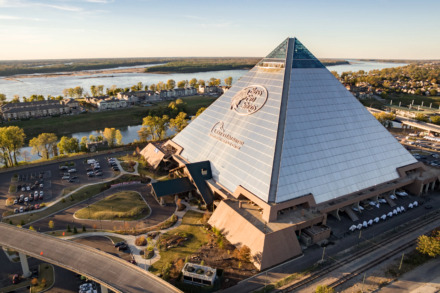 Back
Back
- April 7, 2019
- Our People, Retail Real Estate, Tennessee
The outdoor-goods retailer and tourist attraction took in $45,980,582 in 2018, up slightly from $45,795,504 in 2017, according to city records.
The increase halted a slide that followed the store’s honeymoon in 2015 and 2016, while a puny growth rate reflected what’s going on in retail regionally and nationally.

“I do think they’re very much stabilized,” said Shawn Massey, partner in The Shopping Center Group’s Memphis office.
“Same store sales have not gone up significantly for brick-and-mortar retailers,” Massey said. “They’re holding steady.”
The increase came after Springfield, Missouri-based Bass Pro Shops acquired competitor Cabela’s for about $4 billion in September 2017 and broadened Bass Pro’s product mix.
It was good news for the Downtown tourism development zone, where the city captures a share of growth in state and local sales taxes for spending on approved projects, such as Pyramid- and convention center-related debt.
A tourism development zone is a special financing mechanism that helps the city by keeping money in Memphis that would otherwise flow into state government’s coffers.
Bass Pro Shops Outdoor World opened at the end of April 2015 at The Pyramid, capping a multiyear project to convert the vacant former sports and entertainment arena for retail use.
Bass Pro Shops is privately owned and doesn’t disclose sales figures for individual stores, but sales numbers are reported to the city of Memphis because the property is city-owned. The city provided sales and rent numbers in response to a public records request from The Daily Memphian.
Bass Pro paid $1 million in rent in 2018, its minimum annual rent under a 55-year lease with the city. Rent money is set aside for building upkeep and improvement.
The Pyramid store’s sales were gangbusters in the opening year, although nowhere near levels estimated by a consultant that helped the city vet the project’s economic feasibility.
Bass Pro took in $56.3 million in its first 12 months, and sales flattened out to $49 million in 2016, its first full year.
Retail experts said the decline was normal as the newness of the store wore off.
“You had a first big year, then it fell off,” Massey said. “I think it’s stabilized and it’s going to grow incrementally as Memphis grows,” he added.
“At the macro level, (retailers) in the Mid-South and across the U.S. are maintaining slight growth but not knocking it out of the park as they compete with more online sales,” Massey said.
Acquisition of Nebraska-based Cabela’s probably helped Bass Pro, he said, because Cabela’s brought a heavier emphasis on hunting goods to Bass Pro’s traditional focus on anglers. “Now they’re being more competitive on both sides,” Massey said.

The Pyramid closed in 2007 and was redeveloped for Bass Pro Shops as part of a tourism development zone expansion approved by the state in 2011.
The city issued $197 million in bonds backed by TDZ revenues, spending more than $100 million on the Pyramid and its surroundings and $75 million to buy out Shelby County’s interest in the nearby Memphis Convention Center.
As expected, Bass Pro Shops became a significant contributor to the Downtown tourism development zone when the store opened.
The Downtown tourism development zone collected $20.2 million in the 12 months ending June 30, 2018, down 2.4% from a year earlier.
Bass Pro’s contribution is likely around $4 million, but the exact number isn’t known because the state Department of Revenue doesn’t disclose records on individual taxpayers.
The Downtown TDZ repays about $15 million a year in debt from the Pyramid-Convention Center bond issue.
It generates a surplus of about $5 million a year, which can only be spent on state-approved tourism-related projects inside the zone.
The city administration has been studying how to divide the current and anticipated future surplus among the other state-approved uses, the Pinch District, Mud Island River Park and the riverfront.
Original article appeared here.
